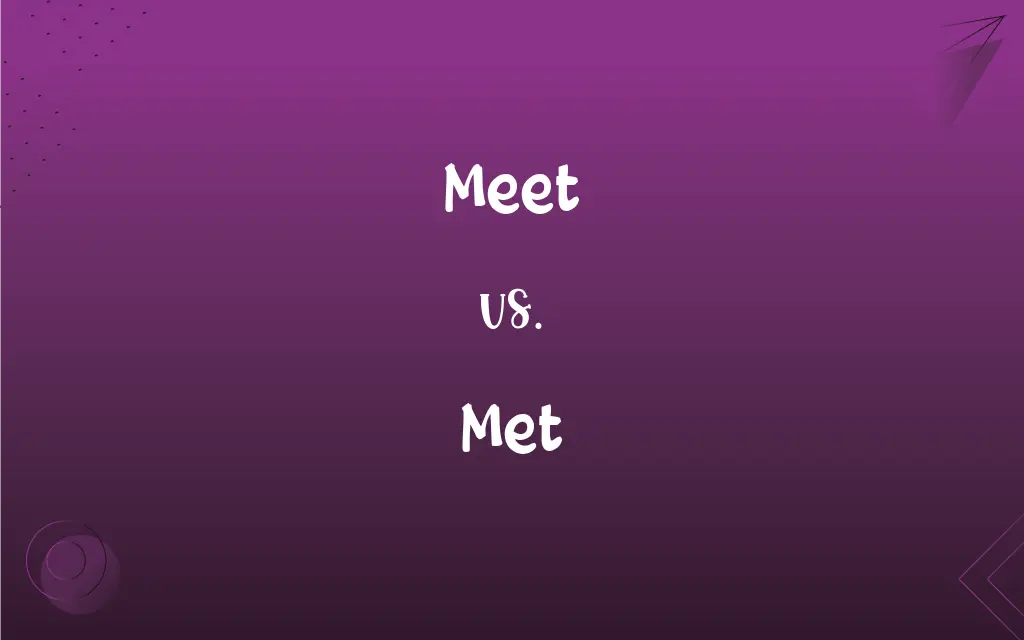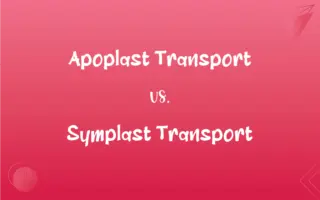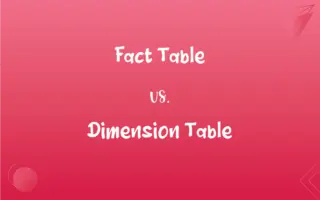Meet vs. Met: What's the Difference?
Edited by Janet White || By Harlon Moss || Updated on October 9, 2023
"Meet" is the present tense form of the verb, indicating a current action; "met" is the past tense, denoting a completed encounter.

Key Differences
"Meet" and "met" are both forms of the verb that refers to coming into contact or connection with someone or something. "Meet" is used in the present tense. When someone says they are going to "meet" a person, it suggests the action hasn't happened yet or is currently ongoing. On the other hand, "met" implies the action of meeting has already taken place in the past.
In sentences, the word "meet" can be used to indicate future intentions or current activities. For example, "I will meet him at the park," or "I meet with her every week." Conversely, "met" would be used to describe past events. An example would be, "I met him at the park last week."
Grammatically, "meet" is a base form, while "met" is the simple past and past participle form of the verb. Thus, "meet" might be paired with helping verbs to create future or present continuous tenses, like "will meet" or "am meeting." "Met," however, can be used to create perfect tenses, like "have met" or "had met."
To provide further clarity, "meet" is an active process or an intention, indicating either an ongoing action or something planned for the future. "Met," however, always refers to a past event, ensuring the listener or reader understands the meeting has already taken place.
Comparison Chart
Tense
Present
Past
ADVERTISEMENT
Usage in Sentence
Describes current or future action
Describes past action
Grammatical Form
Base form of the verb
Simple past & past participle
Example
"I meet him every day."
"I met him yesterday."
Associated Time
Now or Future
Past
Meet and Met Definitions
Meet
To encounter or confront.
They will meet challenges along the way.
ADVERTISEMENT
Met
Past tense of coming into the presence of someone.
I met her two years ago.
Meet
To join or connect.
The two roads meet here.
Met
Previously encountered or confronted.
He met similar problems in the past.
Meet
To fulfill or satisfy.
This meets my expectations.
Met
Previously joined or connected.
The teams met in the finals last year.
Meet
To assemble for a purpose.
We meet every Friday for discussions.
Met
Satisfied or fulfilled in the past.
The requirements were met.
Meet
To come into the presence of.
I will meet him at the station.
Met
Assembled in the past for some reason.
They met last summer for a conference.
Meet
To come into the presence of by chance or arrangement
I was surprised to meet an old friend in the park. I met a friend for coffee.
Met
Past tense and past participle of meet1.
Met
To dream; to occur (to one) in a dream.
FAQs
How do I use "meet" in the present continuous tense?
You can use "meet" with "am," "is," or "are," as in "I am meeting her now."
Can "meet" indicate future actions?
Yes, "meet" can describe future intentions, like "I will meet her tomorrow."
Is "met" the past form of "meet"?
Yes, "met" is the past tense of "meet."
Can "meet" describe two objects coming together?
Yes, like "The two rivers meet downstream."
Can "meet" refer to joining paths or roads?
Yes, "meet" can mean to join or connect, like "The two paths meet at the river."
Is "met" used in the present perfect tense?
Yes, you can use "met" in the present perfect, like "I have met her before."
How can I use "meet" to indicate satisfaction?
You can say something like, "This solution meets our needs."
Is "met" always about people?
No, "met" can refer to meeting challenges, requirements, or even where two things join.
Does "meet" have a noun form?
Yes, "meet" can also be a noun referring to a sports competition or gathering.
What tense is "meet" used in?
"Meet" is used in the present tense.
Does "met" always refer to a past event?
Yes, "met" always denotes a past meeting or encounter.
What's the negative form of "meet" in the present?
The negative form in the present is "do not meet" or "does not meet."
In which situations can "met" be used?
"Met" can describe past encounters, confrontations, gatherings, or fulfillments.
Can "meet" be used in passive sentences?
Yes, for example, "He was met at the airport by his family."
What does "met" mean in the context of challenges?
"Met" can mean previously confronted or encountered, like "She met many challenges head-on."
How does "meet" relate to gatherings?
"Meet" can mean to assemble, like "They meet every week for a game."
How do I use "met" in the past perfect tense?
You can say something like, "I had met him before the event."
How would I say I had an encounter with someone in the past using "met"?
You can say, "I met him last year."
Can "met" indicate satisfaction in the past?
Yes, like "The conditions were met."
What is the past participle form of "meet"?
The past participle form of "meet" is "met."
About Author
Written by
Harlon MossHarlon is a seasoned quality moderator and accomplished content writer for Difference Wiki. An alumnus of the prestigious University of California, he earned his degree in Computer Science. Leveraging his academic background, Harlon brings a meticulous and informed perspective to his work, ensuring content accuracy and excellence.
Edited by
Janet WhiteJanet White has been an esteemed writer and blogger for Difference Wiki. Holding a Master's degree in Science and Medical Journalism from the prestigious Boston University, she has consistently demonstrated her expertise and passion for her field. When she's not immersed in her work, Janet relishes her time exercising, delving into a good book, and cherishing moments with friends and family.































































